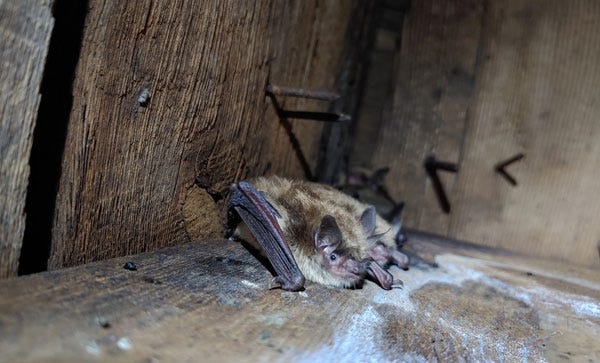Bats Have More Rights than Palestinians
We care about the vitality of a winged mammal, so why are we ignoring the plight of other humans?
Welcome to another edition of Willoughby Hills!
This newsletter explores topics like history, culture, work, urbanism, transportation, travel, agriculture, self-sufficiency, and more.
We’re slowly getting things ready in our new house to make a more permanent move in a few weeks. I spent the weekend meeting with a few contractors to discuss some projects that require attention.
On Friday evening, we had a pest control company come to the house. The pest control company that we called specializes in natural remedies, focusing more on making the environment less conducive to bugs, rodents, and other undesired creatures. The chemical treatments they use are organically based and they are used sparingly.
Even though I didn’t suspect there were any major issues in our attic, at the end of the inspection, I asked the contractor if he wanted to take a peek up there. He noticed a pile of droppings that I had never seen before in the insulation close to the eaves of our house.
The droppings were quite large, much bigger than mouse droppings, and they were all concentrated in one general area. My mind imagined large mammals, none of which I wanted in our attic: rats, squirrels, maybe even a raccoon.
The pest contractor told me that they were bat droppings. Somehow that seemed even worse. I imagined my attic as a dark cave out of a horror movie, with bats flapping around, dangling from the rafters by the thousands.

The contractor reassured me that bats usually aren’t even visible; they tend to crowd together in a corner. In winter when they are hibernating, they are often nestled into the insulation like a blanket, right next to where they enter and exit the building. They almost never take flight in the attic, and if not for that pile of droppings, we may not have even been aware of their presence.
Of course, we aren’t especially fond of making our attic a habitat for bats and would like to rid them from our home.
The method used for bat removal is to seal up any small openings (1/2” or larger) along the attic and roofline, and leave only one tube. The tube allows the bats to escape the attic to forage for food, but it does not allow them to come back inside. The thought is that over the course of a few days, all of the bats in the attic will leave. They will then need to make a new home elsewhere when they cannot get back into my attic. It’s a bit like changing the locks on a house- the bats arrive back home and their key no longer opens the door.
In Massachusetts, there are strict conservation laws governing the removal of bats. At the moment, it’s too early in the season to do any kind of remediation work. The reason for this is that bats are just waking up from hibernation and are hungry. Massachusetts lawmakers wanted to ensure that bats weren’t being forced from their homes when they are still hungry and don't quite have the strength to find a new home. By law, the earliest that bat removal can happen is in May.
Except that window only lasts about a month, because during June and July, it’s bat mating season. Conservationists want to give bats plenty of time to have their babies and for the babies to grow strong enough to fly on their own and gather their own food before forcing them from their homes. Bat mitigation can happen again from August to October, but after October, temperatures get too cold again, halting any bat removal activity through the winter until the following May.
I certainly understand the reason for these laws and am glad that in Massachusetts the legislature has taken such a strong stance in favor of other living creatures. I am supportive of measures like this. After all, I’m not out to kill all of the bats, or even the ones in my attic. I want bats to enjoy my town, eating mosquitoes and other nuisance insects in the process. I just am not fond of the idea of them living in my attic.
Still, as the pest contractor was describing how carefully he needs to treat bats so as not to starve them or hurt their babies, I couldn’t help but think about how bats seem to have more rights than Palestinian people.
Since the establishment of Israel in 1948 and the subsequent Nakba, where Palestinian families were driven from their ancestral lands, the Israeli government and military have acted like the one way tubes which allow the bats to exit but not return.
Any Palestinian who leaves their home to this day is often unable to return, even just to visit. On a recent episode of the
podcast (which hosts and I produce), Zeina Ashrawi Hutchison described how Israel has strong residency requirements for Palestinians to maintain their citizenship. She also described her own personal struggles visiting her family in Palestine after coming to the U.S. as a student, even with the proper visas and paperwork in place.But even more broadly, I think about how the Palestinian people have been treated over the last five and a half months of a very public genocide and how bats in Massachusetts have significantly more rights than actual human beings.
Bats cannot be removed during the summer because it is their mating and baby season and there is concern about killing their offspring. Bats are rightfully allowed to have their babies and those babies are allowed to grow to a viable age before they are excluded from their dwelling.
In Gaza, hospitals have been the target of bombings. Hospitals where women are giving birth and where babies struggle to breathe in the NICU.
This is in direct violation of the Geneva Convetion, which states:
“Civilian hospitals organized to give care to the wounded and sick, the infirm and maternity cases, may in no circumstances be the object of attack, but shall at all times be respected and protected by the Parties to the conflict.”
So it’s not that we don’t have laws in place to protect Palestinians like we do bats. It’s just that Israel breaks those rules. And nobody holds them accountable.
I can’t have bat treatment done right now because there’s concern about the bats waking up from hibernation and starving to death. Have you seen what’s happening in Gaza right now?
The U.S. has been airdropping food as aid to Gaza. As of earlier this month, we have dropped around 41,000 meals. The population of Gaza is more than 2 million people who are currently starving.
The meals that the U.S. are airdropping are also not anything that are going to combat the starvation. In one video, they appear to be MREs like those given to troops on a battlefield. They are freeze dried, processed, and do not sound appetizing at all.
For those who still believe that “Israel has a right to defend itself” or that there’s nothing that the U.S. can do to end this conflict, I think it’s worth reading a recent piece in The Guardian from
.Hasan cites numerous historic examples where a single phone call from an American President has stopped Israeli offensive bombings. One was in 1982 under Ronald Reagan. The other? In 2021. When Joe Biden called Benjamin Netanyahu and ordered him to stop bombing. Two days later, a ceasefire was announced.
People have been demanding Biden to step up again and end the siege of Gaza. His reelection may be in jeopardy if he doesn’t do that. After the Arab American community of Dearborn, Michigan encouraged Democrats to vote “Uncommitted” in the Michigan primary, more than 13% of voters did just that.
On Super Tuesday, the results were even bigger in other states, with “Uncommitted” or “No Preference” receiving 9% of the vote in Colorado and Massachusetts, 13% in North Carolina, 19% in Minnesota, and 29% in Hawai’i.
At the end of February, Biden appeared on Late Night with Seth Meyers and reaffirmed that he is a zionist. Like he literally used those words.
So there’s very little hope that any long term change will be coming to Gaza anytime soon. Palestinians will starve, they will continue to deliver babies in unsanitary conditions who will also starve. And half a world away, we worry about whether the bats in my attic will have a fair shot in this world.
Thanks for reading Willoughby Hills! Subscribe for free to receive new posts and support my work.
Related Reading
If you’ve missed past issues of this newsletter, they are available to read here.






This is a really good read. First I had no idea about the protection of bats in Maine and that made me happy, since I´m vegan and really do think all animals have a right to live. I´m also pro Palestine and have taken a huge dive in learning about the oppression that has been ongoing since the 1940s. It is horrific and I am very much against the USA supporting a full blown genocide.
We’ve had experience with bats living in the walls and chimney in our cottage at Madison-on-the-Lake , OH. Those little critters also leave bat bugs behind that like to bite when you’re sleeping. I have to question why we’re ignoring the plight of other humans over the vitality of our winged mammals that bite us when we’re sleeping.